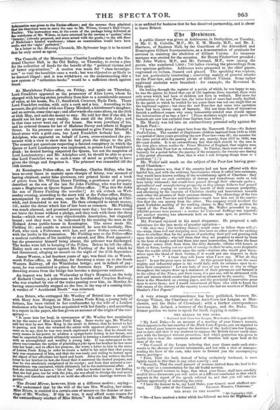Irbe lprobincts.
A public dinner was given at Aahbourne, in Derbyshire, on Tuesday, to Mr. C. R. Colville, M.P., Mr. E. M. Mundy, M.P., and Mr. J. Harrison, of Snelston Hall, by the Guardians of the Alstonfield and Brassington Gilbert Incorporations, as a demonstration of gratitude for services in resisting the abolition of Gilbert Unions. An immense marquee was erected for the occasion. Sir Henry Pitzberbert presided ; Mr. John Walter, M.P., and Mr. Ferrand, M.P., were among the guests, who numbered 1,080; 700 ladies viewing the proceedings from two spacious galleries. Addresses were presented to the chief guests, engrossed on vellum, framed and glazed. The speaking was copious, but not particularly interesting ; consisting mainly of general attacks on the Poor-law, and general praise of Gilbert Unions. Some rather equivocal statistics were broached : for example, the Reverend R. Pole said— On looking through the register of a parish, of which, he was happy to say, be was the pastor, he found that out of 126 baptisms there inserted, there were only seven which bad been of children not born in wedlock. But since the introduction of the new Poor-law, the latter kind of cases had nearly doubled. In the parish in which he resided for ten years there was not one single blot on the baptismal register ; but since the new Poor-law Act came into operation there had been eleven cases of bastardy. Did not these facts of themselves furnish a sufficient reason why every honourably-minded man should oppose the introduction of so base a law ? [These statistics might simply prove that bastards are now less excluded from baptism than before.)
Mr. Mundy was led into an extraordinary personal sally against Sir Robert Peel
" I have a little piece of paper here from the Tamworth Union—Sir Robert Peel's Union. The number of illegitimate children baptized from 1833 to 1836 —a period of three years preceding the new Poor-law—was 49; the number for the same period after the passing of the act, namely, from 1837 to 1840, WAS 98—just double. It is an extraordinary fact that such should be the case in the very place where resides the Prime Minister of England, that mighty man who upholds this Poor-law so vehemently. In Paisley, there were six cases of bastardy for a period before the passing of the measures; for twenty-one during a like period afterwards. Now, that is what I call bringing things home to a gentleman" ) Mr. Walter said much on the subject of the Poor-law having generated Chartism— His firm opinion was, that if the country bad not been afflicted with this hateful law, and with the arbitrary functionaries whom it called into existence, they would have known nothing of the revolutionary spirit of Chartism: they would have had no such outbreaks of riotous and tumultuous mobs as had been lately witnessed; but would have passed through their alternate cycles o agricultural and manufacturing prosperity as they always hitherto had passed trough them ; reaping in common the benefit of their common prosperity, and alleviating by the exercise of Christian charity and benevolence towards each other the pressure of their common distress. The chronology of the two events—the new Poor-law and Chartism—would bear him out in the conviction that the one sprung from the other. The company would recollect the great Yorkshire meeting of the working classes in May 1837, to petition for repeal of the Poor-law. At this meeting, Mr. Walter proceeded to say, 200,000 persons were present : a motion for Universal Suffrage was rejected; but another meeting was afterwards held on the same spot, to petition for Universal Suffrage. Mr. Ferrand rejoiced in his usual eloquence. He proposed a safe substitute for the late mode of popular agitation— "Oh, that they [the working classes] would cease to follow those will-o'the-wisps, those evil and designing men, who have no other motive for exciting them to rebellion than for the purpose of pocketing their pelf and growing rich. upon their credulity; who tell them that they are prepared to stand by them in the hour of danger and lead them into open insurrection, but when the hour of danger comes slink from them like dirty dastards; villains with hearts as black as Satan having not one spark of courage in their breasts, more despicable than the reptile which crawls upon the earth—traitors who would glut themselves upon the blood of their victims, if it would put one sixpence in their pockets. • •5 I trust they will know what I now say. What do they want? Is not the press open to them ? At this present hour, is not the most mighty and influential paper in the world daily with its columns open to redress their complaints ? Let any body of men of any town or city or village throughout the empire draw up a statement of their grievances and forward it to the editor of the Times, and their cause' if a just one, will be advocated with zeal and talents which render that journal an ornament to the country. Then there is the Standard, an evening paper, and the provincial Conservative press open to serve them; and I would recommend all those who wish to know the real causes of the distress of the country to read the last six numbers of Richard Oastler's Fleet Papers."


























 Previous page
Previous page